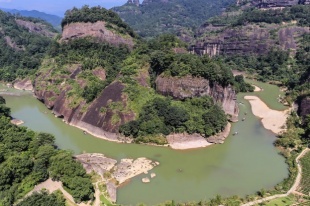Mount Wuyi


Category of site: Mixed site
Brief introduction
Wuyi Mountain, located in China's southeast province of Fujian, contains the largest, most representative example of a largely intact forest encompassing the diversity of the Chinese Subtropical Forest and the South Chinese Rainforest. Of enormous importance for biodiversity conservation, the property acts as a refuge for an important number of ancient, relict plant species, many of them endemic to China, and contains extremely rich flora and fauna, including significant numbers of reptile, amphibian and insect species.
Wuyi Mountain is also known for being of great historic and cultural value. Cultural relics include the extensive remains of an ancient city of the Min Yue people, dating back over 2,000 years, the Ziyang Academy of Classical Learning, the tomb of Zhu Xi, and cliff side sculptures. Zhu Xi, a philosopher of the Southern Song Dynasty (1127-1279), taught for 40 years at Wuyi Mountain and made it an academic center of East China.
In 1999, Wuyi Mountain was added to the world cultural and natural heritage lists.
Natural heritage
The Wuyi mountain range, usually called Greater Wuyi Mountain, straddles the border of East China's Fujian and Jiangxi provinces, stretching over 500km. The average height of the peaks is over 1,000m above sea level.
The most beautiful part is the Small Wuyi Mountain scenic area, 15 km southwest of the Chong'an County seat, Fujian province. It is surrounded by streams and valleys, and has no direct link with neighboring mountains.
The special Danxia landform features include the Stream with Nine Turnings, 36 peaks, 72 caves and 99 rocks. The distinctive views of monoliths of red sandstone surrounded by emerald green water inspire the imagination.
Cultural heritage
The most ancient scene on Wuyi Mountain contains stone slabs and boat-shaped rocks over deep gullies, a prestigious natural wonder. Viewed from above the water, two stone boats stand on several crisscross slabs on the top of the cliff. The boats are about 6m length, and in rhombic form, just like those said to be used by the immortals. Huge rocks, deep caves and pools are three special sights of Dazang Peak.
Wuyi Mountain was the cradle of Neo-Confucianism, a doctrine that played a dominant role in the countries of Eastern and Southeastern Asia for many centuries and influenced philosophy and government over much of the world.
Wuyi Mountain is a landscape of great beauty that has been protected for more than 12 centuries. It contains a series of exceptional archaeological sites, including Han City, established in the 1st century BC and a number of temples and study centers associated with the birth of Neo-Confucianism in the 11th century.
Wuyi tea
Wuyi tea, formerly known by the trade name "Bohea" in English, is a category of black and oolong teas grown in the Wuyi Mountain. The Wuyi region produces a number of well-known teas, including Lapsang souchong and Da Hong Pao. It has historically been one of the major centers of tea production in Fujian province and globally. Both black tea (excluding brick tea) and oolong tea were likely invented in the Wuyi region, which continues to produce both styles today.
Wuyi teas are sometimes called "rock teas" (yancha) because of the distinctive terroir of the mountainsides where they are grown. Tea grown in the rocky, mineral-rich soil is highly prized. Because of the lower yield produced by tea bushes in such terrain, the resulting tea can be quite costly. Tea made from the leaves of older bushes is particularly expensive and limited in quantity. Da Hong Pao, collected from what are said to be the original bushes of its variety, is among the most expensive tea in the world, and more valuable by weight than gold. Commercial-grade tea grown at lower elevations in the area accounts for the majority of the Wuyi tea available on the market. Commercial Da Hong Pao is made from cuttings of the original plants.
Legends and stories
There is a beautiful legend about Yunv Peak. Yunv, a fairy maiden, fell in love with Dawang, an earthly king. She came to Wuyi Mountain and enjoyed its fantastic natural beauty with the king, so she decided to stay there. However, a demon named Tieban (Iron Plate) informed the Jade Emperor. The Jade Emperor flew into a rage and turned the demon into a peak, known as Tieban Peak, to separate Dawang Peak from Yunv Peak. Therefore, the two lovers couldn't see each other though they were only a short distance away.





































